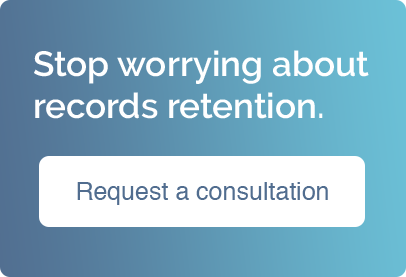The cornerstone of any business record keeping is having a solid record retention schedule in place. This policy clearly defines what documents need to be maintained and for how long. In addition, a retention schedule helps to ensure that businesses are in compliance with state and federal laws.
Retention schedules are designed to outline exactly how long documents must be retained and provide a policy for when and how to dispose of documents that are eligible to be destroyed. A retention schedule enables all employees to maintain the specific requirements that are pre-established by their place of employment and maintain consistency among all staff and documents.
A retention schedule serves a vital role in any organization, serving as the organization’s legal authority for retaining and destroying records. A retention policy will include all types of documents and records that are created on behalf of the company as part of a business. An important element of all retention schedules is a timeline, laying out how long each type of record must be maintained in the company’s records before it can be destroyed.
Risk of Not Having a Retention Schedule
There are numerous risks associated with not having or adhering to an established schedule. The more records to be retained, the higher the associated risk, when no retention schedule is used. Developing a retention schedule requires the development, implementation, and management of a credible policy that all staff is expected to follow. Justification to keep records for a shorter or longer time period that differs from the pre-established retention schedule can increase an organization’s exposure to unnecessary risk.
The more information and records that an organization retains, the greater the responsibility is to identify, locate, and reference all documents within their legal compliance. Without an existing method to identify all records, the time and resources required to locate documents can be substantial. There is also increased added risk when an organization is unable to locate or unintentionally withhold required documents.
Benefits of Having a Record Retention Schedule
By developing and implementing a record retention schedule, an organization can:
- Improve their overall utilization of resources
- Control the growth of records volume
- Demonstrate compliance with regulatory recordkeeping requirements
- Enforce the consistent implementation of record keeping policies
- Improve ability to locate and retrieve records when required
- Reduce litigation risks
The risk of not having an organizational retention schedule is substantial and avoidable for any company. For assistance or more information on setting up a retention schedule for your organization, contact Information Requirements Clearinghouse today!


